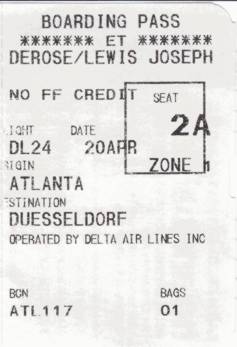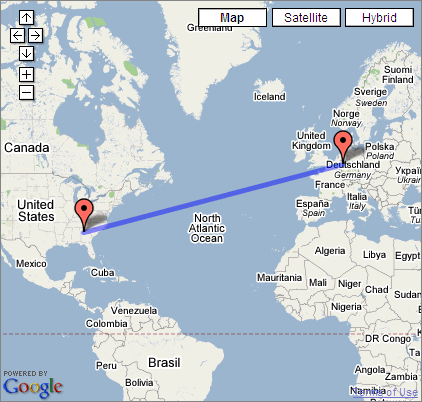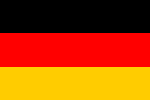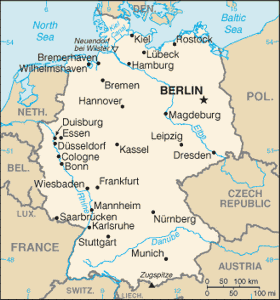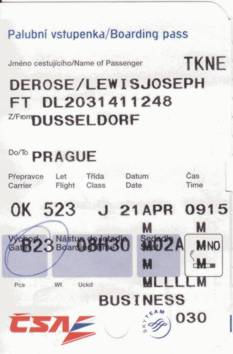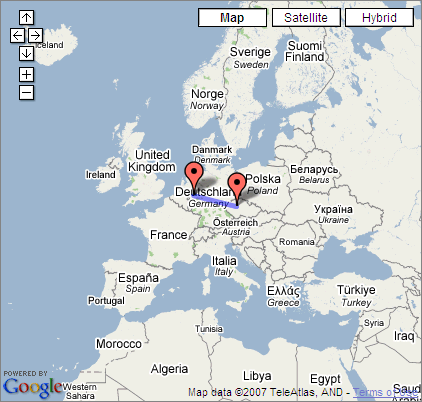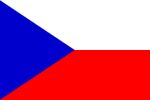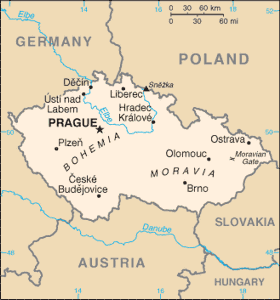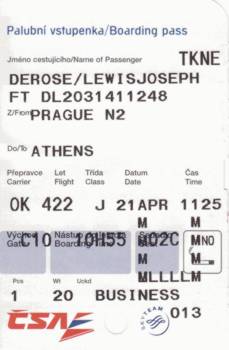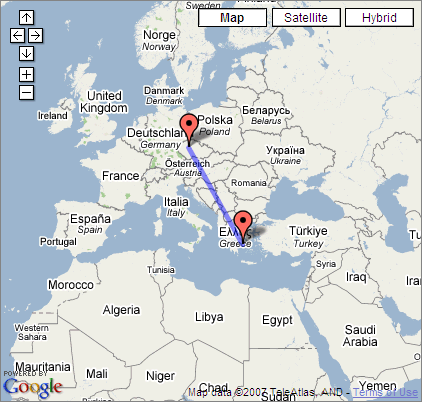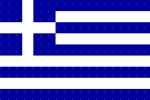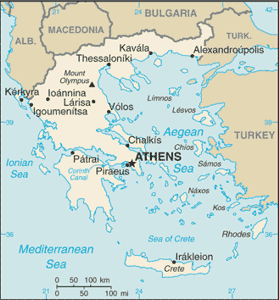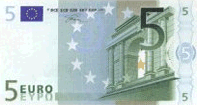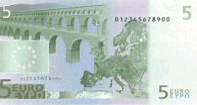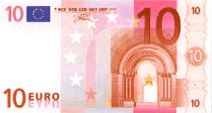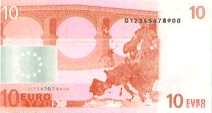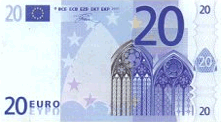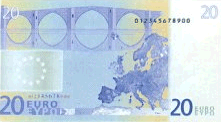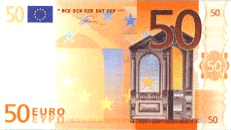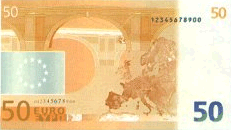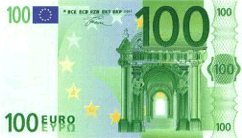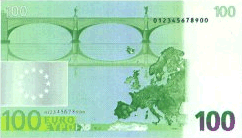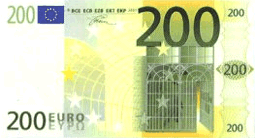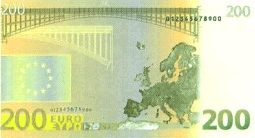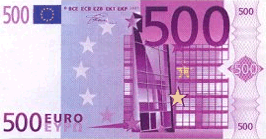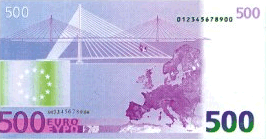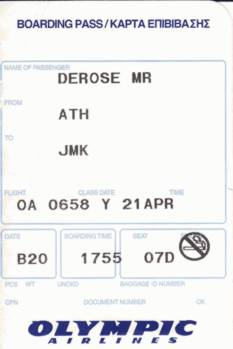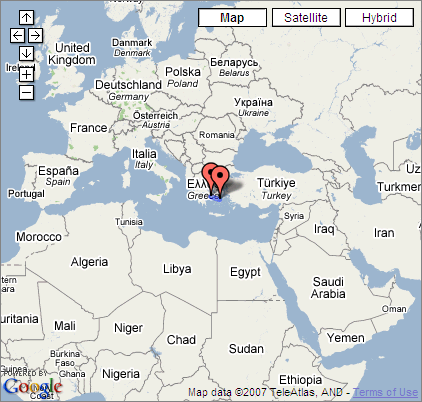Παρασκευή και Σάββατο, κʹ και καʹ Απριλίου ͵βζʹ
| 20 | ● | κʹ | ||
| 21 | ● | καʹ | ||
| 22 | κβʹ | |||
| 23 | κγʹ | |||
| 24 | κδʹ | |||
| 25 | κεʹ | |||
| 26 | κϝʹ | |||
| 27 | κζʹ | |||
| 28 | κηʹ | |||
| 29 | κθʹ | |||
| 30 | λʹ | |||
| 1 | αʹ | |||
| 2 | βʹ | |||
| 3 | γʹ | |||
| 4 | δʹ | |||
| 5 | εʹ | |||
| 6 | ϝʹ | |||
| BusinessElite |
 We financed much of the air travel on this trip by cashing in 200,000 SkyMiles, which meant that we had to fly a crazy route even though I began planning at the maximum-allowable 330 days in advance. Even with such diligence, we had to call back several days in a row before finding any itinerary at all: 3 legs going, and 2 returning, on 3 different SkyTeam airlines. But we did get to make the journey in BusinessElite!
We financed much of the air travel on this trip by cashing in 200,000 SkyMiles, which meant that we had to fly a crazy route even though I began planning at the maximum-allowable 330 days in advance. Even with such diligence, we had to call back several days in a row before finding any itinerary at all: 3 legs going, and 2 returning, on 3 different SkyTeam airlines. But we did get to make the journey in BusinessElite!
And I'm ashamed to admit this, but I was really into flying business class from a "keeping up with the Joneses" perspective: All of my friends had done it. And raved about it! Many of them had access to Delta Buddy Passes, so they had to dress nicely and mind their Ps and Qs. But I had it made: I flew in in the front seats in my normal slobwear.
 I worried that BusinessElite would damage my egalitarian socialist credentials, but fortunately, my convictions have emerged unscathed. And even if that weren't the case, I can't imagine myself paying real money for the privilege. Why, even if I had enough SkyMiles in the future, I'd probably conserve them by flying coach. Specifically:
I worried that BusinessElite would damage my egalitarian socialist credentials, but fortunately, my convictions have emerged unscathed. And even if that weren't the case, I can't imagine myself paying real money for the privilege. Why, even if I had enough SkyMiles in the future, I'd probably conserve them by flying coach. Specifically:
- The Crown Room was nice, but a bit snobby for my taste. It had great snacks, though. And I'm never unhappy in a place where there's unlimited free Diet Coke.
- The food was good, but on Delta it wasn't great (stay tuned for the CSA food report, though). It was plentiful (four-course dinner and two-course breakfast), but that didn't really work to our advantage. The in-flight menu said that we had complete control over the sequence and timing of meals, but I got the distinct feeling that this was more of a goodwill promise than an actual intention: The serving of food was clearly choreographed and didn't seem to lend itself to too much extemporaneity.
- I don't drink, so that benefit was completely lost on me.
- I liked being able to check the plane's position on the route map any time I wanted, but really it's just ocean most of the time.
- I had looked forward to the choices in the entertainment system, but that was when I imagined a TiVo-like interface. In actuality, they just have seven movies that they start simultaneously. And by the time you (1) realize they've started, (2) figure out the controls, and (3) find the one you want, you've missed a lot. (I'm told that Delta is replacing these systems with an OnDemand-like console, so perhaps this particular complaint will have a short shelf-life.)
- Unlike most trips, I did actually sleep a few hours in the big seat, and I could even roll to my side (sort of). But the seat didn't lie flat; rather, it was like trying to nod off in a BarcaLounger. It was, however, nice to be able to recline without the sense of committing injustice to the person behind.
- They make a deal of the "goody bag," but it's stuff that you either generally get in coach too (just not so nicely wrapped) or don't really need: I got a blindfold, some socks, some earphone covers for the hard-wired headset, a shoehorn, a toothbrush (but no toothpaste), earplugs, moisturizer, and a "do-not-disturb" medallion to lay on my tray table.
![]() So I was satisfied but not impressed. I'm not alone in this, by the way: Shortly after getting back I saw an interview with the woman who is heir to the Frommer's travel legacy (and fortune). She travels extensively and could afford to fly first class every time, but says that she always flies coach because first class is a waste of money.
So I was satisfied but not impressed. I'm not alone in this, by the way: Shortly after getting back I saw an interview with the woman who is heir to the Frommer's travel legacy (and fortune). She travels extensively and could afford to fly first class every time, but says that she always flies coach because first class is a waste of money.
So in the long run, my fondness for the proletariat variety of international leisure travel won out. But I did have my weak moments: I'm disgusted to remember thinking on more than one occasion, "Why don't you notice I want a refill? Can't you see how big my seat is?"
|
|||||||
8 Hours, 50 minutes |
|
||||||
|
|||||||
So we landed in Germany, went through customs and immigration, re-entered security, and waited for our next flight. We were there for an hour and a half, almost as long as our previous visit when we saw Neuchwanstein after having lunch – and before having dinner – in Austria. I'm a bit self-conscious that I've been in Germany twice now, and still haven't spent the night, or even eaten a meal, there.
|
|
 I didn't have high hopes for
I didn't have high hopes for
We had a very short (60-minute) layover in
|
|||||||
1 Hour, 10 minutes |
|
||||||
|
|||||||
And thus we got to check a new country off our list: the Czech Republic. Now people accuse me of going places not to see them, but just to say that I have been to them, and will roll their eyes when I talk about "checking a country off our list." This is absurd; I don't pretend to have any awareness of the glory of Prague just because I happen to have landed in its airport. But it is equally absurd to say (as some would have me do) that I have never been to the Czech Republic. Indeed, people create strange legalistic strategies (not unlike the whole ridiculous "What counts as sex?" question) for identifying whether one has actually been in a country one has been in; suggestions I've heard include the following:
- You must be conscious of being in the country.
- You must be subject to its laws.
- You must take a breath of air there.
- You must exit the airplane (or car or train or whatever).
- You must be legally admitted.
- You must go outside in the open air.
- You must touch the earth with your feet.
- You must have a meal.
- You must spend a night.
Some countries don't even lend themselves to all of these terms: Vatican City, for example, has no facility for spending the night (if you're not a cardinal). I'm not aware of a public restaurant there (although perhaps there was one in the Musei Vaticani). And I don't think there is any public area in Vatican City that is unpaved, allowing you to touch the earth with your feet.
But on the flip side, how useful are any of these as a guide? To this question, I must offer two countries from my own experience:
- Austria: There is absolutely no basis for dispute that Billy and I have been to Austria: We were consciously there as we took tens of thousands of breaths of Austrian air. We repeatedly exited the car we used to get there. We were officially admitted by the Gendarmerie at the Swiss-Austrian border (had our passports checked and our trunk searched and everything) and were thus subject to Austrian laws. We stood in the open air. Our feet touched the unpaved earth. We ate several (wonderful) meals. And we spent the night in Nassereith. But we have little in common with people who have traveled to Austria; indeed, we have not seen Vienna or Salzburg or Innsbruck. In fact, if we had made better time, we would have kept driving and spent the night in Switzerland. We have no overlapping frame of reference for tourist activities; we simply entered a corner of the country and – by chance, not intention – managed to jump through every hoop that has been presented as a marker for having visited a nation.
- San Marino: Before I discuss San Marino, let me start closer to home: the United States of America. It would be absurd even to go through the checklist for the United States – I'm a U.S. citizen resident in the U.S.; clearly I have been to the United States of America. And I have seen a lot of the U.S. But by percentage I have seen more – a lot more – of San Marino. But I haven't been in the position to check off every item on the list. In fact, there are several countries that I have seen (due to relative size, mostly) more of than my own country. It would be crazy to say that I haven't visited such places just because I didn't spend the night or have a meal or whatever.
I feel most comfortable with an extremely generous assessment of whether a country has been visited. In fact, the only situation I can imagine in which one might be in a country's physical space without having visited it would fall when you are traveling in a vehicle that dips into the country briefly but at a time when you are unaware of its having done so – for example, train tracks in Europe often dip into a neighboring country for a short distance to avoid some impediment, but without stopping and without the border being announced to passengers.
So here is the philosophical ground on which I land: During this trip I visited the Czech Republic and Cyprus. I didn't see them thoroughly; in fact, for most purposes I didn't seen them at all. But I visited them. I hope that someday I will get back to both of them – but when I do, it won't be my first time there.
I tried to buy a Coke with a twenty-dollar bill just hoping to get some koruny in change, but it was not to be. The clerk noticed I had two dollars in my wallet (the approximate equivalent) and asked for exact change.
|
|
So we hopped on our second CSA flight, and enjoyed our fourth meal in fourteen hours. But it was a delicious meal: probably the best pork that I've had in my life (Billy agreed). CSA really knew what they were doing with that celebrity chef thing!
|
|||||||
2 Hours, 35 minutes |
|
||||||
|
|||||||
And we landed in our second new country of the day – one that we would actually be spending a good amount of time in – and got another boring European rectangle in our passports.
|
|
And we got to use the euro – which used to be exciting. In fairness, the euro is a cool concept, with its windows and doorways on the front (to symbolize openness) and its bridges on the back (to symbolize connections), all of them fictitious (to avoid privileging one of the member countries). And it's a hell of a lot prettier than the dollar – even the new, subtly colored versions of the dollar (which Billy calls "Baskin Robbins money"). But we've used the euro on three of our past four vacations, so now I'm jaded. At least there's a slight concession to novelty in that it's called the
|
||||||||||||||||||||||||
Fortunately, the Athens airport is big, busy, and interesting, which almost kept us entertained for our three-hour layover before the flight to Mykonos. But, unfortunately, we were too tired to shop and too full to eat. (Well, too full to eat much – we did have some pastries that looked enticing.)
| Greek |
So here I was, about to have an experience for the first time in my life that, considering my background, should not be so alien (or so intimidating) to me: I was about to spend the night in a country where I didn't speak the language. I had actually been sufficiently concerned about this that I enrolled in a Greek class at the Emory Center for Lifelong Learning – but the class wasn't deep, and I was too mired in Arabic to give it the attention it deserved. Still, the study was effective to some extent in that I learned to read, pronounce, and respect
|
First, with Greek a few unlikely facts bear mention:
Yet as it has evolved, it has done so in a very limiting way, and I am not alone in thinking so: John Wilkins wrote in his work, An Essay towards a Real Character and a Philosophical Language: "Notwithstanding which, that [Greek] Alphabet is still in several respects defective." As an example, it starts with 24 letters. But because three of these letters make exactly the same sound, and two of them duplicate another sound, it throws in a group of doubled letters to allow the flexibility that the language demands (such as the sound of the English B and D, which are respectively ΜΠ and ΝΤ). But several of these combined letters duplicate sounds as well, such that the vowel sound of the English word "beet" can be written in six different ways: Η, Ι, Υ, ΕΙ, ΟΙ, ΥΙ. In the following lists, all of the like-shaded characters are pronounced the same.
Still, I liked it enough that I learned to type it, too: Greek Keyboard:
Honesty, though, demands the confession that this wasn't hard at all: There's an obvious correlation to Latin letters, as demonstrated by the following identical sequence of characters on the two different keyboards. It's meaningless in Greek, of course (and orthographically inappropriate in that the final sigma ["ς"] is in the middle of the word "brown" and the initial/medial sigma ["σ"] is at the end of the word "jumps"), but it shows how easily the person familiar with typing in English can switch to Greek.
Yet, as you can see above – and even more below – the lower-case letters are a bit more challenging to recognize than the upper-case ones:
The punctuation is certainly fun, though. Most of it is identical to English, but the question mark evolved (independently of the Latin alphabet) to the same shape that we use as a semicolon:
|
|||||||||||||||||||||||||||||||||||||||||||||||||||||||||||||||||||||||||||||||||||||||||||||||||||||||||||||||||||||||||||||||||||||||||||||||||||||||||||||||||||||||||||||||||||||||||||||||||||||||||||||||||||||||||||||||||||||||||||||||||||||||||||||||||||||||||||||||||||||||||||||||||||||||||||||||||||||||||||||||||||||||||||||||||||||||||||||||||||||||||||||||||||||||||||||||||||||||||||||||||||||||||||||||||||||||||||||||||||||||||||||||||||||||||||||||||||||||||||||||||||||||||||||||||||||||||||||||||||||||||||||||||||||||||||||||||||||||||||||||||||||||||||||||||||||||
| Mykonos |
 I looked into Olympic Airlines early in the trip planning, and I had sworn I would not fly on them. Everything that could be bad about an airline was:
I looked into Olympic Airlines early in the trip planning, and I had sworn I would not fly on them. Everything that could be bad about an airline was:
- Their logo looks like it was exactingly crafted to avoid copyright infringement laws.
- Their schedule was a pain in the ass for the leg I was then researching (Athens to Tel Aviv, departing at 2:20 AM and arriving at 4:15 AM).
- Their website (since fixed) was a disaster.
and - Their reward program is named the "Icarus Club"!
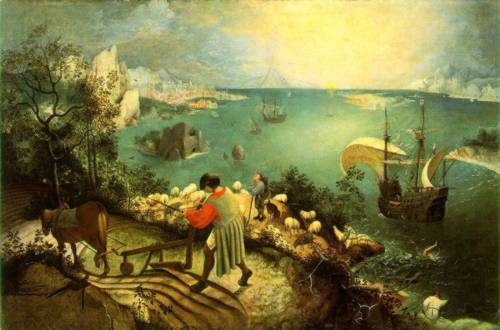 |
| Landscape with the Fall of Icarus Pieter Bruegel, c. 1554-55 |
But Olympic came through for me on the Athens-to-Mykonos leg, with a good fare and a convenient schedule. And I forgive them – even though the window panel next to my seat got really, really hot during flight and I thought the plane was going to crash.
But the plane didn't crash – although when it landed I thought it might wreck: The pilot swerved off the runway toward the terminal when we were still decelerating from the landing. It's the only time that I've had to brace myself against the seat to keep from falling into another passenger when a plane was taxiing on the ground.
Still, I liked it: The plane had propellers, which was cool in a retro kind of way. The seats were tiny (there was no first class, and we were off the SkyMiles itinerary anyway). But the flight was short so who cares? Snack service stopped when they reached the row behind us (moving toward the front of the plane, because of turbulence), but that was fine since we had been very well fed already. So what if they cut a few corners (some literally)? Olympic was entertaining.
|
|||||||
40 minutes |
|
||||||
|
|||||||
| Billy and Me, Ready to Start Our Trip This was after 17 hours of flying in four planes on three airlines, so we may not look our best. That's the entire Mykonos airport, by the way; the person taking the picture was standing against the far wall. |
So we were finally in
We got off the plane (reporting the short circuit in the seat panel to the crew) and waited for our luggage. About a day ago, we had hoped we could take the backpacks into the cabin – but the Delta staff gently allowed us to understand that this was a ridiculous aspiration. Once on board, I could see their point. But they did hook us up with huge and durable plastic bags, which protected all of our straps from entanglement and our clasps from breakage – and our luggage from a beer explosion: On the Olympic flight, someone's beer had popped all over my backpack. But inside the giant plastic bag everything was copasetic.
We took a taxi to to the town of Mykonos. (You'll sometimes see it called
Our hotel, the Philippi, was a spectacular introduction to this vacation. It is everything that I look for in a hotel: unusual, attractive, conveniently located, unique, and comfortable.
|
I love weird stuff, so it pleased me immensely that the lights would not work unless the room key was inserted into a particular socket near the door: |
Billy was enthusiastic about showering and cleaning up. I was enthusiastic about exploring the town. Mykonos is an absolutely charming warren of alleyways; rarely is it possible to see more than 50 m in a direction before the narrow walkway swerves left or right or up or down. Apparently this was done deliberately, to help the residents fend off pirate attacks back when such risks were more common. It's not as hard to keep your bearings as some people say, but it is difficult to follow the same route more than once.
|
So I walked around the town while Billy got ready for supper: |
I made my way back to the hotel (only needing to ask directions once), and then Billy and I set out for supper. We ate a good meal at a pleasant restaurant at an intersection of two of the alleys. Billy had seafood risotto; I had grilled calamari with cheese. An enormous pelican walked by.
Upon returning home, we learned that there is an interesting background to the pelican(s) of Mykonos: In 1954, a Mykonian fisher found a wounded pelican and nursed it back to health. Once his work was done, however, the pelican refused to fly to freedom, but rather chose to wander around the town of Mykonos. The townspeople adopted this pelican as a mascot and named it Petros. In 1986, however, Petros's long life came to an end. The townsfolk grieved – but their dedication to Petros was rewarded by Jacqueline Kennedy Onassis, who donated a new pelican, named Irene, to the island. The Hamburg Zoo was also moved to make a pelican donation to the island, this one named Petros like the original. And finally another injured pelican was found, nursed back to health, and chose to remain on Mykonos, and was named Nikolas. But in general, people in Mykonos refer to any of the pelicans as "Petros."
![]() Jet lag was working in our favor, so after dinner we took a leisurely walk back to the hotel. First I grabbed a (fantastic) Nutella crêpe from a hole-in-a-wall shop on one of the streets. Then we just walked around, taking in the charm of Mykonos town by night. Another of the pelicans was sitting by the waterfront.
Jet lag was working in our favor, so after dinner we took a leisurely walk back to the hotel. First I grabbed a (fantastic) Nutella crêpe from a hole-in-a-wall shop on one of the streets. Then we just walked around, taking in the charm of Mykonos town by night. Another of the pelicans was sitting by the waterfront.
|
|
Finally, we returned to the Philippi to sleep.
| Main | ||||||||
| 20 | κʹ | |||||||
| 21 | καʹ | |||||||
| 22 | Next | Επόμενος | κβʹ | |||||
| 23 | κγʹ | |||||||
| 24 | κδʹ | |||||||
| 25 | κεʹ | |||||||
| 26 | ח׳ | |||||||
| 27 | ט׳ | |||||||
| 28 | ١٠ | |||||||
| 29 | ١١ | |||||||
| 30 | ١٢ | |||||||
| 1 | ١٣ | |||||||
| 2 | ١٤ | |||||||
| 3 | ١٥ | |||||||
| 4 | ١٦ | |||||||
| 5 | ١٧ | |||||||
| 6 | ١٨ | |||||||
